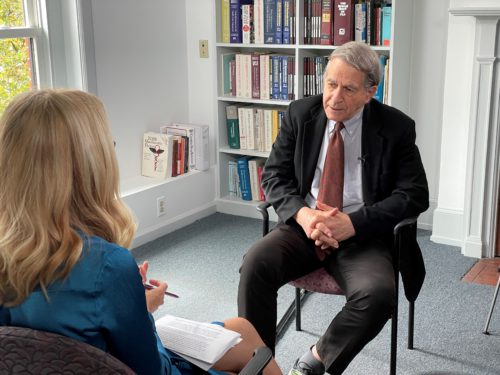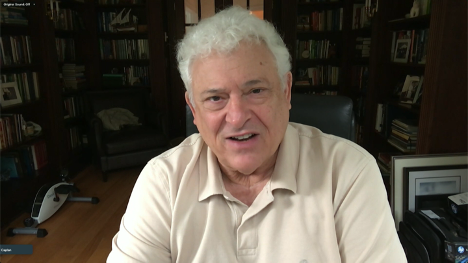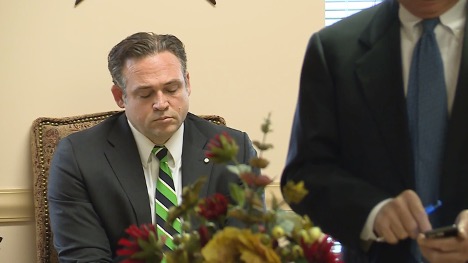By Joce Sterman and Daniela Molina, InvestigateTV
(InvestigateTV) – Inside a tightly packed conference room on a drab November day in Kentucky in 2018, members of the state’s Board of Medical Licensure took just five seconds to approve a decision many found surprising.
The panel, tasked with oversight and discipline for Kentucky’s 10,000 physicians, voted to reinstate the license of a man named Dr. Michael Heilig.
Six months earlier, in May 2018, the orthopedic surgeon had failed a hospital drug screen after a nurse raised concerns that Heilig had been impaired in the operating room, board records show.
Dr. Heilig’s case is an example of what critics consider a lenient and often secretive system governing doctor discipline across the country.
Describing Dr. Heilig’s behavior to an investigator, the nurse said that the doctor, “almost fell” and was “talking a little weird” during the first surgery of the day in May 2018.
During the second surgery, she said that he was “not acting like himself.”
And as he began the third, Heilig was “stumbling with his eyes closed and mumbling.” The doctor, she said, was so confused about the order things needed to be done that the procedure was ultimately scrapped.
But even though board records show Heilig had been self-prescribing Ambien, which is a sedative used to treat insomnia, that he was diagnosed with two substance use disorders and that he signed a contract with a special state program designed to monitor doctors battling addiction, his license was not suspended or revoked.
Instead, Heilig agreed not to practice until he had at least 90 days of sobriety under his belt.
And just six months after his alleged impairment in the operating room, the licensing board was signing off on his ability to safely practice medicine with a restricted license. The ruling allowed him to work as long as he abstained from drugs and alcohol, followed the rules of the program, and submitted to random testing.
The board’s decision was a shock to former patients, including Danny Davis, who said Heilig had performed surgery on his arm, with disastrous results. He became aware the surgeon was back in practice through a flier sent to his home.
Davis told InvestigateTV affiliate WKYT in 2018, “It seemed like just a mild slap on the wrist and to be so quickly reinstated after some of the things he’s done, it makes absolutely no sense. If we’re looking to them to safeguard us in terms of licensing qualified doctors, they have absolutely failed in that.”
But what many consider lax, deferential action by Kentucky’s board is not unique.
InvestigateTV spent months digging into discipline for addicted doctors. After scouring hundreds of pages of records from every state medical board across the country, we discovered:
· A secretive treatment and oversight process for physicians struggling with substance abuse that critics say protects doctor reputations while leaving patients in the dark.
· Time lags in informing medical boards and the public about significant issues involving addicted doctors.
· Lenient, delayed punishments for physicians who have put people at risk while battling their own addictions.
“It’s a serious threat to patients.”
Dr. Sidney Wolfe has been a vocal critic of the doctor discipline system for decades. He’s the founder of the Health Research Group for the consumer advocacy organization, Public Citizen.
Dr. Wolfe explained that addiction issues involving physicians are typically handled first by confidential Physician Health Programs, or PHPs, which are run by state organizations across the United States.
Those programs give addicted doctors an avenue to get clean and sober, while potentially avoiding discipline. But an October InvestigateTV investigation found doctors’ identities are generally kept secret when they’re in a PHP, even when they’re cleared to return to work.
As a result, patients may have no idea their physician is being monitored, routinely screened for drugs and alcohol and allowed to practice under a laundry list of restrictions.
“Would you knowingly go to a doctor who you know had recently had a problem with drug or alcohol abuse? Most people would say no,” Dr. Wolfe said.
But under the current system, patients, generally, are not informed about doctors in rehabilitation programs or recovery, unless there’s an imminent risk to the public or until a doctor repeatedly breaks the rules laid out by their PHP program.
That’s when state medical boards are typically informed. They may hand down disciplinary action in some cases, and it’s through those records that the public gets a glimpse into what’s been happening behind closed doors.
Critics like Dr. Wolfe say it’s a disturbing picture, “Among the categories that I think are most outrageous and dangerous is the failure to act more promptly and more completely against those doctors with substance abuse disorders.”

Dr. Sidney Wolfe, founder of the Health Research Group at Public Citizen, talks about transparency issues associated with PHPs in the organization’s Washington, D.C. headquarters (Scotty Smith, InvestigateTV)
Disciplinary action against doctors can be difficult for public to find
InvestigateTV looked at disciplinary actions taken against impaired physicians or physicians in recovery across the country, looking evidence of violations of PHP rules and impairment incidents that the public would likely struggle to find.
In states like Idaho, Utah and Washington, InvestigateTV discovered that doctor disciplinary action is tucked into online newsletters.
It’s only vaguely referenced on state websites in Colorado, Connecticut, Georgia, Iowa, and Kentucky, where the public must search physicians individually by name on a separate page to get specifics about their misconduct.
In Arkansas, access to discipline records for an individual physician requires a request to the board.
Hidden behind these barriers are doctors arrested for DUIs on the way to work, physicians found in possession of heroin after showing up for their hospital shifts, and even a doctor who, following repeated drug test failures, continued to practice after agreeing not to.
Art Caplan, head of the Division of Medical Ethics at the NYU Grossman School of Medicine, said, “Medicine is a field that relies almost completely on trust. When we don’t have transparency about reasons that trust might not be deserved, we have a problem.”

Art Caplan, head of the Division of Medical Ethics at the NYU Grossman School of Medicine, talks about the system for disciplining doctors battling drug and alcohol addiction (Scotty Smith, InvestigateTV)
Disciplinary system gives struggling doctors multiple chances
InvestigateTV examined how quickly PHPs inform medical boards when doctors have serious or repeat problems, how swiftly the boards act and how harshly physicians are punished when they relapse, fail to comply with program rules or put patient safety at risk.
When it comes to PHPs informing medical boards about non-compliance, some doctors get multiple chances before boards are told they aren’t following program rules, InvestigateTV learned.
Take the case of an Indiana family medicine doctor, for example. In 2018, he was enrolled in the state’s PHP following drug abuse treatment. Records show he failed three required drug tests in 2019 before the state board was ever informed. The physician’s license was suspended after he was charged with two separate incidents of driving under the influence in 2020. He later retired.
“I think the boards have to be much more aggressive in suspending licenses and being to the point where they might even revoke the license,” Caplan said. “The boards have to be tough when people fail to manage their addictions.”
Even extreme cases don’t always warrant revocation, investigation found
Although Caplan believes firm, fast action is what is warranted in situations where physicians relapse and could pose a risk to patients, InvestigateTV found that license revocations are rare, even in some extreme cases.
In Utah, records show a doctor who admitted to a ketamine and marijuana addiction in 2018 was allowed to surrender his license. When he reapplied in 2020, the state board did revoke his license, but immediately reversed the decision and put the physician on probation.
In 2020, disciplinary records from Wisconsin’s medical board tell the story of a doctor who reported drinking before work, driving intoxicated and treating patients while in active withdrawal. That individual went to rehab and was enrolled in the state’s PHP.
Records say he started drinking daily and dropped out of the program in 2021. In January, he was fired for working while impaired. But the state did not discipline him until June when the medical board suspended his license. But two months later, it lifted the suspension.
“I believe we’re leaning too hard right now in many states, not all, but in many, to protect the physicians’ interests first. And that’s because the regulatory system is dominated by doctors who are looking out for their fellow physician and not thinking at any particular time about an individual patient or what might occur,” Caplan said.
Heilig case is back in the spotlight
Back in Kentucky, there’s little insight into the thinking of the state’s medical board when it comes to its decisions related to Dr. Michael Heilig, the physician put back into practice just six months after alleged impairment in the operating room. The board did not respond to repeated emails and calls seeking comment.
InvestigateTV also repeatedly requested on-camera interviews with the Federation of State Medical Boards, which represents boards across the country.
The organization declined interview requests and did not answer specific questions about the doctor discipline system. In a statement, the FSMB said, “The primary mission of state medical boards is to protect the public by ensuring physicians are properly licensed, trained, and fit to practice medicine. As part of that mission, state medical boards have a responsibility to support physician wellness because patient safety depends, in part, on physician health. A therapeutic alternative to discipline is therefore an important means of assessing and supporting physician wellness where patient safety is not at immediate risk. State medical boards work with their respective physician health programs (PHPs) to help encourage physicians to seek treatment early for impairing conditions and to ensure that physicians experiencing impairment are appropriately treated and rehabilitated in order to safely reenter practice.”
Dr. Heilig did not respond to multiple attempts to reach him over the last month. Brandon Sword, one of Heilig’s attorneys, said he could not comment because of ongoing litigation, but did tell InvestigateTV, “Dr. Heilig is a longstanding member of the medical professional whose priority is providing exceptional care and treatment to his patients.”
In December 2021, Heilig lost a civil lawsuit filed by a former patient who claimed he wasn’t fit for surgery. Rebecca Pritchard was awarded $800,000 in the case that detailed complications she experienced following a hip replacement. Heilig performed Pritchard’s surgery just two days before failing that 2018 drug test that resulted in him being pulled from the operating room.

Dr. Michael Heilig, a Kentucky physician, listens as the state’s medical board makes a ruling on his license (WKYT)
With at least a dozen civil cases from other patients alleging harm still looming, Dr. Heilig is back on the radar of Kentucky’s medical board.
In July, records show Heilig agreed not to practice medicine while the board completes a new investigation. The reason behind their probe is yet another mystery in a doctor discipline system that critics believe puts the emphasis on private practice.
Research into state medical boards, doctors’ disciplinary history and PHPs was conducted by InvestigateTV Associate Producer Bailey Williams and students from the Arnolt Center for Investigative Journalism at Indiana University. They are: Kayan Taraporevala, Lizzie Wright, Ryan Fields, Caroline Geib, Lily Staatz, Lizzie DeSantis, Lauren Ulrich, Sophie Kaelble, and Olivia Blanco.


